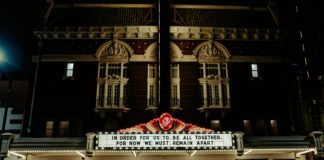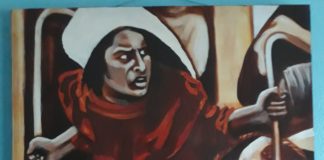In the classical Greek myth, Pandora opened her infamous box, releasing death, destruction and untold suffering into the world, much like a virus called COVID-19. But then she closed it as quickly as she could, and she trapped inside one remaining human attribute.
This was hope.
Throughout this series on my journey through a pandemic, I’ve sought to be candid about my own experience, through the phases of fear, euphoria, depression, and acceptance — which at times have included moments of great doubt. I’ve also sought to be clear-eyed about the ravages of this scourge to our community and the nation’s most vulnerable. As I write, the daily death count in the United States is hovering around 4,000, and experts say the current toll of 360,000 will grow by at least 100,000 victims before vaccines afford us all true immunity.
And as I write, the nation is beginning to grapple with the horrific events of Jan. 6, the ransacking of the U.S. Capitol and the aftermath, acts of sedition that defy adequate description. But listening to the wiser leaders the morning after, Democrat and Republican, I was encouraged by their hopeful messages that we are in a moment of restoration for our institutions so battered by the toxic politics of the last four years.
Indeed, much unleashed by our modern day Pandora continues to its ravages. But looking beyond this pandemic, I am filled with this last human attribute to which our mythical Pandora managed to hang on. While acknowledging the challenges of recovery, reasons for hope abound.
I believe that a similar spirit of hopeful renewal will determine the future of the next stages in education, healthcare, social equity, and certainly a new era of business defined by conscious capitalism. Animating all of this will be the concept of access, a theme that really binds this series together.
My essential point is this:
Initially, Zoom (or Google Meet or Microsoft Teams), telemedicine, streaming, online classes, document sharing tools like Google Docs, collaboration tools like Slack or data.world, digital signatures, online or curbside shopping, instant message apps, and so much else were akin to floating planks in a brutal storm. Some of us were more familiar with them than others — those of us in the tech sector had a head start to be sure. So did the digital natives, who don’t remember a world without the internet and who certainly never used a rotary phone. But all of us grasped these relatively new creations, often in desperation, to keep lives and families together and companies afloat.
Not just handy workaround but building blocks of a new society
But now, as we emerge from nearly a year of cocooning, masking, and working and learning from home, these are no longer just useful planks fortuitously around us in the roiling sea. They are the building blocks of the new knowledge economy and knowledge society that the seers have been predicting for decades. In a word, universal and ubiquitous access is the attribute of hope I see towering on the near horizon.
Coupled with this idea of access is the second point I want to make, and this is the emerging concept of hybridization. We don’t know exactly how our court systems will work now that even the U.S. Supreme Court has “worked from home.” We don’t know how temporary regulations allowing online medicine to bend around privacy compliance laws will evolve. We don’t know precisely how schools, businesses, and local governments will organize themselves when virtual access and connection is no longer an emergency workaround but rather an exciting option to improve everything.
This fusion of the digital and analog worlds is hard to imagine, but think of the way the mingling of cultures through immigration and innovation have created the kosher vegan tamales that are easy to find in Austin. “What,” you ask? Well, just supercharge that melding process of immigration, innovation, and new knowledge and soon you have, as just one example, the first COVID-19 vaccine itself, history’s first mRNA vaccine.
This was, in short, the result of the work that really began with a Hungarian immigrant researcher at the University of Pennsylvania. Her decades of pioneering work, and that of those who followed her, was incorporated into a trans-Atlantic consortium. This became the science-in-the-fast lane, distributed collaboration between U.S.-based Pfizer, which is headed by an immigrant CEO from Greece, and Germany-based BioNTech, headed by an immigrant CEO from Turkey.
I marvel at the pace with which scientists, and the private and public sectors and global institutions, all mobilized to get shots in the arm in less than a year from the first sequencing of the virus’ DNA. But let’s not forget that this stunning entrepreneurial tale, enabled by access to multiple minds, labs, and research, was in many ways a mere dress rehearsal for our future.
Let’s take education. Before the pandemic, my son, for example, was already attending the innovative K-12 school Alpha. Like some other schools, including Austin’s public Liberal Arts and Science Academy, or LASA, Alpha has been pushing beyond the show-up-and-be-counted model for some time. But still, Levi’s learning has accelerated during the pandemic. Gone is the commute for him and the wasted time. He attends school via Zoom, makes the grades he needs to (and excels), and then spends the other seven hours per day programming and playing complex games online with friends, constantly chatting via Discord (a Slack-meets-WhatsApp type of tool). He has more time to live his passion, not less.
Just this week, I was on a call with a fellow CEO to learn more about “Massive Open Online Courses”, or MOOCs, where more nearly 400,000 students are enrolled in more than 2,900 classes offered by 160 different universities — all free. Yes, we need to close the so-called “digital divide” ASAP. And the suffering of students without bandwidth in East Austin in the early days of the pandemic is shameful in a city like Austin — one of the most educated large cities in the United States.
The aperture is opening on access to our most primary knowledge need, education. And it’s not just learning for those of traditional school age. There are incredible opportunities for those eager to learn to plug into the best minds and organizations. I’m even turning my online book, The Entrepreneur’s Essentials, which is available for free on Medium, into an online video course captured by Zoom for the Israel Institute of Technology, or Technion, the oldest university in that country, frequently compared with MIT, and profiled in the terrific book Start-Up Nation: The Story of Israel’s Economic Miracle. That simply wouldn’t have happened pre-pandemic, and we plan to soon make it free outside the university as well.
The new world of digital-analog hybridization
Or we can take the example of arts, culture, and entertainment. Of course we’ll go back to live music here in the Capital of Live Music, just as Broadway exploded with theater in 1919 after a year of closure during the flu pandemic the year before. But at the same time, the new streaming services of Alamo Drafthouse, the Austin Film Institute, and others will bring access to new films and filmmakers for audiences around the world.
The opportunities to advance the critical and long-delayed reckoning between Americans of all races is now moving at digital speed. Locally, my friend Dr. Peniel Joseph, founder of the Center for the Study of Race and Democracy at the University of Texas at Austin, and author of the seminal book on civil rights history, The Sword and the Shield, will speak later this month in honor of remembering MLK at my synagogue — by Zoom of course. Just as he’s now speaking at countless engagements around the country every week, impossible before we all became accustomed to the technology.
I should mention that in November, data.world announced that we will be hosting a free and open Data Resource Hub for the study of policing in America, enabling widespread access for researchers, policymakers, and the public. The hub combines information collected by the Policing in America Survey with existing data assets produced by federal, state, and local agencies and other non-profit initiatives. Microsoft, Congressional members, and many others have been eager to partner with us on this.
Meanwhile, the movement known as “conscious capitalism,” with roots in Austin thanks to John Mackey and which includes public benefit “B corporations” that enshrine social responsibility in corporate bylaws, has taken a huge leap forward. Ann Florini and I have even called for Facebook to become a B corporation in the face of endless criticism of its practices. And elite groups such as the World Economic Forum in Switzerland have called for the nurturing of a “Fourth Sector” to similarly blend the social goals of non-profit philanthropy with those of for-profit business and investment models.
And lastly, unfolding before our eyes, is the phenomenon of Austin and Texas overall winning on both the interstate net immigration front as well as the tech business front. But it’s so much more than just Silicon Valley tech titans like Elon Musk moving operations and headquarters to Austin, or the criticism that unbridled growth will drive gentrification and burden schools and transit. And it’s much more than engineers and software developers trading in tiny condos in Menlo Park or Seattle for suburban McMansions to work from Austin in larger, remotely distributed teams. Though that is part of it.
For all the reasons I’ve sought to describe, Austin’s future is ours to create and it should not be some scaled down replica of Silicon Valley. New ways to work, new ways to reskill our workforce for the well paid tech jobs of tomorrow, the fact that we are a tech hub astride the world’s energy capital of Houston — for both old and green energy like solar and wind — allow us to drive toward something unique. My good friend Josh Baer talked about the incredible opportunity we have in front of us if we just seize it in his Texas Startup Manifesto. And if we really work hard at it, together, then Austin can become a beacon for our nation – both in creating the new economy as well as bringing the old economy, and those that have been disenfranchised for decades, along for the ride.
And that’s a hope worth fighting for.
Also in this series
Part I: Fear
Part II: Euphoria
Part III: Depression
Part IV: Acceptance






